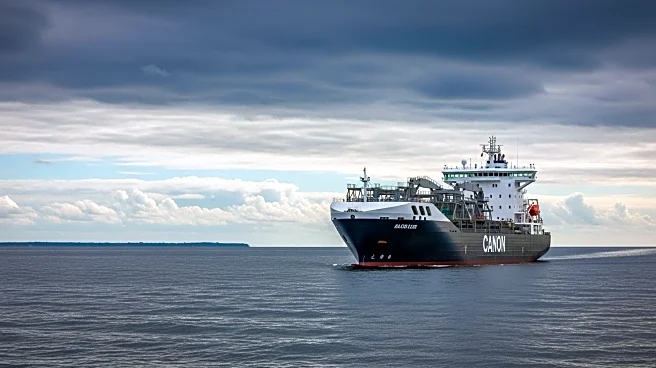What's Happening?
The U.S. shipping industry is at a pivotal moment as it navigates upcoming decisions that could significantly impact its future. Jeanne M. Grasso, a partner at Blank Rome law firm, highlighted the industry's increased visibility due to U.S. tariff policies and Western sanctions against certain tanker fleets. Key issues include the U.S. Trade Representative's fees on Chinese-built, owned, or operated ships, and the International Maritime Organization's (IMO) Net-Zero Shipping Framework, which is set for a vote in mid-October. Additionally, reports mandated by President Trump's Executive Order on Restoring America’s Maritime Dominance are due soon, alongside the SHIPS for America Act, which awaits Congressional hearings. The Federal Maritime Commission is also conducting investigations into trade impacts and port choke points. The industry is adapting to new fees, with some companies considering restructuring based on investment definitions. Legal challenges to the USTR's regulations are rumored but not yet filed.
Why It's Important?
These developments are crucial as they could reshape the U.S. shipping industry and its role in global commerce. The tariff policies and decarbonization efforts may lead to significant changes in fleet deployments and operational strategies. The U.S. opposition to the IMO's decarbonization framework could affect international trade relations and regulatory environments. The industry's response to these challenges will determine its ability to maintain competitiveness and adapt to evolving global standards. The uncertainty surrounding these issues highlights the need for clarity and stability, which are essential for strategic planning and investment in the shipping sector.
What's Next?
The shipping industry is awaiting further clarification on the USTR's fees and regulations, with promised publications from U.S. Customs and Border Protection expected soon. The IMO's vote on the decarbonization framework will be a critical event, potentially influencing global shipping practices. The U.S. administration's actions following President Trump's executive order, including the Maritime Action Plan, will be closely watched. The appointment of new leaders in the Maritime Administration and Federal Maritime Commission could also impact future policy directions. Stakeholders are preparing for potential legal challenges and adjustments to regulatory changes.
Beyond the Headlines
The broader implications of these developments include potential shifts in international trade dynamics and environmental policies. The U.S. stance on decarbonization could lead to fragmented regulations, affecting global shipping operations. The industry's adaptation to new tariffs and fees may influence investment patterns and strategic alliances. The ongoing investigations by the Federal Maritime Commission could uncover systemic issues affecting U.S. trade, prompting further regulatory actions. These changes may also impact the U.S. economy, particularly in sectors reliant on maritime transport.









